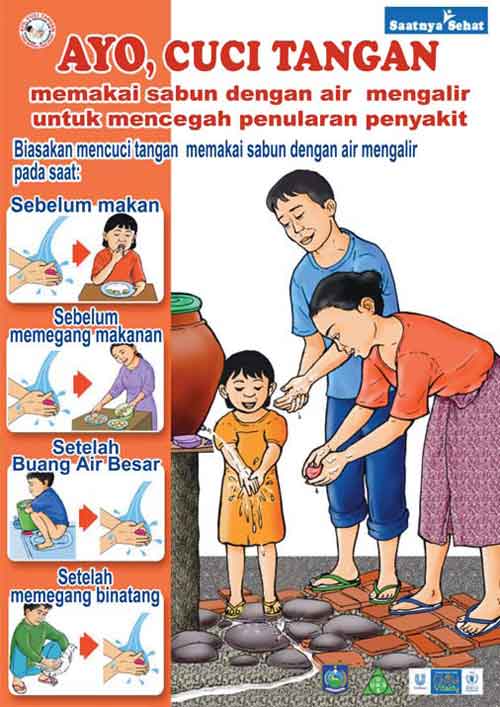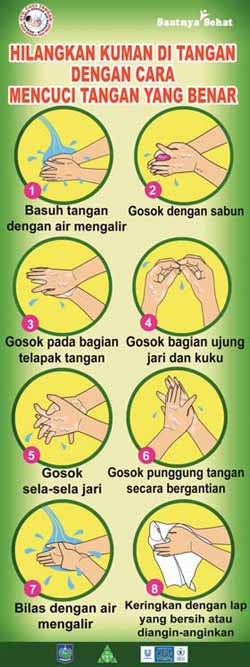Hygiene awareness: Improving school attendance and participation in Indonesia
Alphonsine Bouya, Leo Nederveen and Waila Wisjnu
Educational achievements can be linked to healthy behaviour, a healthy body and a healthy living environment. Poor sanitation and hygiene is disastrous for infants and young children, and has an impact on the health of school-age children. This article outlines how the World Food Programme (WFP) in Indonesia has integrated hygiene messages into its school feeding programmes as part of its efforts to improve children’s attendance and participation in education. In particular, the programme has focused on the basic task of hand washing.
How does good hygiene impact on children’s inclusion in education?
Illness causes many children around the world to miss significant amounts of schooling. Studies have shown, for instance, that worm infections (which may result from poor hygiene, such as not washing hands before eating) can cause irregular school attendance and may negatively affect children’s cognition and performance when they are at school.
The importance of hygiene education
Simply providing safe and clean water and sanitation facilities in schools is not enough. Behavioural change is also needed to ensure proper use and maintenance of the facilities and better hygienic behaviour. In the fight against diarrhoeal disease, hygiene education, including hand washing, is the single-most cost-effective health intervention. Hygiene education is not only important for a healthy school environment and student performance, it also offers opportunities for communicating with and influencing children’s families.
Health, nutrition and hygiene education focuses on developing the knowledge, attitudes, values and life skills needed to make appropriate and positive health-related decisions. An active, child-centred and participatory teaching approach is required in the promotion of life skills. Hygiene awareness needs to be linked to practical lessons and involve the classroom, school environment, home and wider community.
WFP’s campaign
WFP supports school feeding programmes designed to improve enrolment, attendance and retention of children in school, as well as their learning conditions and environment. A baseline study in the district of East Lombok, Indonesia, showed that knowledge of the benefits of hand washing was low and the practice needed to be promoted, especially at home. WFP-Indonesia worked in partnership with Unilever (a company that makes cleaning and personal hygiene products). They developed a hand washing campaign in 55 schools in the district. The campaign benefits 12,200 students and their teachers, parents and communities.
Through a participatory workshop, WFP, Unilever and government officials analysed existing school health programmes and the results of a ‘knowledge, attitudes and practices’ survey. A campaign strategy was developed and joint responsibilities for implementation and monitoring were defined.

Example of a poster showing the importance of handwashing
Strategic allies in the implementation of the campaign included provincial and local government authorities, religious leaders, health personnel and community health workers.
The campaign aimed to promote hand washing with soap – at the right times and using the best method – among school children. Printed and audio-visual education and communication materials were developed, pre-tested, approved by the government, and produced.
An inter-sectoral District Working Group was trained in the campaign messages and materials. They passed on the training to teachers, health centre personnel, community-based mother and child health services, and religious leaders.
At school level, soap and towels have been provided in some schools, while others have used the government subsidy to renovate hand washing facilities. Teachers have developed interactive activities with children, using the campaign’s comic books and posters.
Children’s participation
Personal hygiene behaviour has also been promoted using child-to-child methods. So called ‘little doctors’1 use a notebook of indicators to check the personal hygiene of their classmates. For example, they check if nails have been cut or if hands are clean before eating.
Competitions have taken place, encouraging schools to complete their hygiene action plans. Children participated in a drawing competition focusing on awareness of hand washing. A panel of representatives from WFP, partner NGOs and the government reviewed the overall performance of schools and the children’s drawings. They gave awards to the best schools and drawings during the province’s anniversary celebrations.

Hand washing campaign poster
Monitoring and evaluation
Monitoring and evaluation have been continuous during the campaign. Through the ‘little doctors’ programme school children have participated in this process, e.g., weekly monitoring the personal hygiene behaviour of their classmates.
The programme will be evaluated in late 2010. Meanwhile, teachers observed that improved hand washing practices have led to better attendance and improved physical performance. Fewer children are reportedly ill on school days. They are regularly reminded to wash their hands before eating their meals, and their hands are checked, which has led to improved personal hygiene.
What next?
The intention is to roll out the campaign to all WFP-supported schools in Indonesia. In addition, the experience of this pilot will be shared with relevant hand washing forums. This could make hand washing an integral part of Indonesian government policy and an activity recognised as an essential element in any effective school feeding programme.
Contacts:
Alphonsine Bouya (Alphonsine.Bouya@wfp.org) is a Programme Adviser in the WFP Programme Design Service
Leo Nederveen (Leo.Nederveen@wfp.org) is a Consultant in Health and Nutrition Education, working for WFP
Waila Wisjnu (Waila.Wisjnu@wfp.org) is a Senior Programme Assistant in WFP-Indonesia.
World Food Programme
Via Giulio Viola 68/70
00148 Rome, Italy
1 The ‘little doctors’ approach is part of the School Health Units programme of the Physical Health Centre of the Ministry of National Education.
